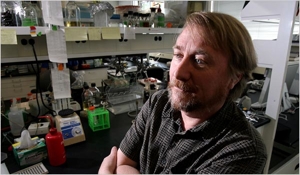
The Birth of the New, The Rewiring of the Old | The Loom
In 1988, Richard Lenski, an evolutionary biologist now at Michigan State University, launched the longest running experiment on natural selection. It started with a single microbe–E. coli–which Lenski used to seed twelve genetically identical lines of bacteria. He placed each line in a separate flask, which he provisioned with a scant supply of glucose. The bacteria ate up the sugar in a few hours. The next day, he took a droplet of microbial broth from each flask and let it tumble into a new one, complete with a fresh supply of food. The bacteria boomed again, then starved again, and then were transferred again to a new home. Lenski and his colleagues have repeated this procedure every day for the past 24 years, rearing over 55,000 generations of bacteria.[…]
In Chapter Three, life got better for the feeble citrate eaters. They copied the citT gene, along with its oxygen-switch promoter. Now the bacteria could make even more CitT channels, and thus pull in even more citrate. The bacteria made a third copy, and could pull in even more. Blount and his co-authors proved that the extra copies helped the bacteria this way by defrosting bacteria from Chapter Two and inserting copies of citT into them. Those early citrate eaters immediately got much better at feeding.
The scientists also found other mutations that arose during Chapter Three. While they have yet to figure out what those mutations did, the evidence they’ve gathered so far suggests the mutations allowed the bacteria to break down citrate more efficiently so they could get more energy from their food.
And those scientists sure do have a lot of patience.
Elsewhere:
- Creationist to Bill Nye: Kids should be aware of evolution’s flaws
“Evolution is the fundamental in all of life science, in all of biology,” he says in the video. “It’s like, it’s very much analogous to doing geology without believing in tectonic plates. You’re just not going to get the right answer. Your whole world is just going to be a mystery instead of an exciting place.”



Add a comment
Post